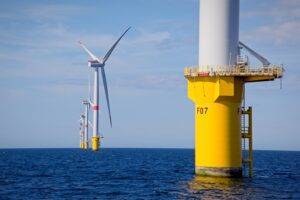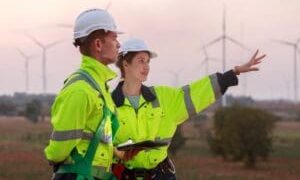BP has announced a pause on all new offshore wind projects as the company’s newly appointed CEO, Murray Auchincloss, pivots focus back to fossil fuels. This strategic shift, first reported by Reuters, also includes a hiring freeze within the offshore wind division.
Auchincloss, who took over at the beginning of the year, aims to decelerate investments in large-scale, low-carbon projects like offshore wind that do not promise immediate returns. This move contrasts with the policies of his predecessor, Bernard Looney, who had begun transitioning the company away from fossil fuels before resigning last autumn due to personal scandals.
This shift back to fossil fuels has been influenced by investor concerns over the profitability of BP’s renewable energy ventures, especially as oil and gas profits surged with the global economic recovery post-pandemic and the geopolitical instability following Russia’s invasion of Ukraine.
Sources within BP have indicated that Auchincloss and CFO Kate Thomson are prioritizing investments in existing oil and gas operations, particularly in the Gulf of Mexico and US onshore shale basins. These areas are expected to generate more immediate returns compared to the long-term investments required for offshore wind projects.
BP remains open to investing in biofuels and other low-carbon ventures that can offer quicker returns. Recently, BP agreed to purchase a 50% stake in a Brazilian sugar and ethanol joint venture from grain trader Bunge for $1.4 billion (£1.1 billion).
Despite these changes, BP is expected to implement some job cuts within its renewables sector, though specific targets have not been disclosed. A company-wide hiring freeze is also in effect, with exceptions for essential frontline and safety personnel.
Since taking the helm, Auchincloss has emphasized a pragmatic approach, including a $2 billion cost-saving drive by the end of 2026 and a streamlined executive leadership team. BP’s statement to Reuters outlined six priorities introduced by Auchincloss aimed at making BP a “simpler, more focused and higher value company.” These priorities include enhancing efficiencies and advancing BP’s growth projects.
The company’s shares have underperformed in recent months, leading to speculation about potential takeover bids and increasing pressure on Auchincloss to balance the need for decarbonisation with the immediate demand for fossil fuels.
In 2023, BP allocated $2.5 billion to renewables, hydrogen, electric car charging, and biofuels out of a total investment budget of $16 billion. Despite these investments, BP remains the only major oil company with explicit targets to reduce its oil and gas production. Shell, by contrast, has recently adjusted its strategy to focus on high-return businesses, scaling back investments in many renewable and low-carbon energy sectors.
The decision to halt offshore wind projects is likely to provoke backlash from climate activists who have long campaigned for BP’s transition to clean energy. As the company navigates these complex dynamics, the actions of Auchincloss will be closely watched by both investors and environmental advocates.

























